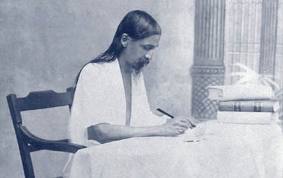
Most of us, at some time in our life, feel the call of the Spirit, the wish to enter into the spiritual path. Generally this remains a wish, and very little is done to take it up seriously. Our other concerns are too many and too pressing.
However, for a few, this inner call becomes very strong and they set out on this difficult journey. But very soon one realizes that the path is not easy. At every step one is confronted with all the imperfections, limitations, perversions of one’s own nature. One gets frustrated and depressed. One is convinced that the imperfections are too strong. One will never achieve the goal, one is just not meant for yoga and the spiritual path.
The question arose in the mind of a spiritual seeker who was overpowered by this situation:
Question : I find innumerable imperfections in my nature. There is no progress, nothing seems to be happening, after each rise there is a fall. Sometimes I feel I become even worse than before. With these imperfections is it not a clear indication that I am not meant for yoga, that I am incapable of following the spiritual path? Should I not give up this futile effort?
Here is Sri Aurobindo’s reassuring reply full of compassion and spiritual insight. With this answer no sincere seeker should have any doubts about his ultimate destiny.
Imperfections cannot be a bar
The existence of imperfections, even many and serious imperfections, cannot be a permanent bar to progress in the yoga. (I do not speak of a recovery of the former opening, for according to my experience, what comes after a period of obstruction or struggle is usually a new and wider opening, some larger consciousness and an advance on what had been gained before and seems-but only seems-to be lost for the moment.) The only bar that can be permanent-but need not be, for this too can change-is insincerity…
If imperfection were a bar, then no man could succeed in yoga; for all are imperfect, and I am not sure, from what I have seen, that it is not those who have the greatest power for yoga who have too, very often, or have had the greatest imperfections. You know, I suppose, the comment of Socrates on his own character; that could be said by many great yogins of their own initial human nature.
The one thing that counts
In yoga the one thing that counts in the end is sincerity and with it the patience to persist in the path-many even without this patience go through, for in spite of revolt, impatience, depression, despondency, fatigue, temporary loss of faith, a force greater than one’s outer self, the force of the Spirit, the drive of the soul’s need, pushes them through the cloud and the mist to the goal before them.
Imperfections can be stumbling-blocks and give one a bad fall for the moment, but not a permanent bar. Obscurations due to some resistance in the nature can be more serious causes of delay, but they too do not last for ever. The length of your period of dullness is also no sufficient reason for losing belief in your capacity or your spiritual destiny. I believe that alternations of bright and dark periods are almost a universal experience of yogis, and the exceptions are very rare.
The reason for dark periods
If one inquires into the reasons of this phenomenon,-very unpleasant to our impatient human nature,-it will be found, I think, that they are in the main two:
The first is that the human consciousness either cannot bear a constant descent of the Light or Power or Ananda, or cannot at once receive and absorb it; it needs periods of assimilation; but this assimilation goes on behind the veil of the surface consciousness; the experience or the realisation that has descended retires behind the veil and leaves this outer or surface consciousness to lie fallow and become ready for a new descent. In the more developed stages of the yoga these dark or dull periods become shorter, less trying as well as uplifted by the sense of the greater consciousness which, though not acting for immediate progress, yet remains and sustains the outer nature.
The second cause is some resistance, something in the human nature that has not felt the former descent, is not ready, is perhaps unwilling to change,-often it is some strong habitual formation of the mind or the vital or some temporary inertia of the physical consciousness and not exactly a part of the nature,-and this, whether showing or concealing itself, thrusts up the obstacle. If one can detect the cause in oneself, acknowledge it, see its workings and call down the Power for its removal, then the periods of obscurity can be greatly shortened and their acuity becomes less.
The assurance
But in any case the Divine Power is working always behind and one day, perhaps when one least expects it, the obstacle breaks, the clouds vanish and there is again the light and the sunshine. The best thing in these cases is, if one can manage it, not to fret, not to despond, but to insist quietly and keep oneself open, spread to the Light and waiting in faith for it to come; that I have found shortens these ordeals. Afterwards, when the obstacle disappears, one finds that a great progress has been made and that the consciousness is far more capable of receiving and retaining than before. There is a return for all the trials and ordeals of the spiritual life.
Sri Aurobindo





